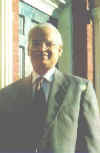|
|
||||
|
Ambassador of Nepal Ambassador of Pakistan Ambassador of Sri Lanka
History Made Easy South Asian Memories
|
|
|
||
|
the-south-asian.com December 2000 |
||||
|
Page 1 of 2
Mr. Damodar Prasad Gautam Ambassador of the Royal Kingdom of Nepal to the U.S.
Tenure in DC We have had the best of relations with the U.S. Government and I have had great support from everyone in the Government. I have had to interact with American citizens from all walks of life business, politics, management, leadership. Also, there is a good-sized Nepalese community here [estimated number 10,000] and I have a rewarding experience working with them. They are involved in diverse fields they are teachers, technology professionals, lawyers, doctors, engineers, professors and general workers. What would you ideally like to see happening in South Asia in the coming decades South Asia is fortunate in one sense it is culturally very rich, diverse, with talented people who have a tremendous potential, but South Asia is not so fortunate in another sense because it has been suffering from conflicts since a long, long time. There are cultural conflicts, social conflicts, political conflicts all hindering the development of the region. These conflicts have to be resolved. How will the conflicts be resolved and who will do it Mankind loves nothing better than peace. Conflict is not the desire of any society. The desire to resolve conflicts must be felt at all levels it is not exclusively the responsibility of the Government to find peace, make peace or create peace. People are equally responsible. It is not either-or. Both the Government and the people will have to work together. The people will have to create the atmosphere, exert pressure and tell the Government to find ways and means, and explore all possibilities for peace.
Can economic opportunities eclipse political issues in South Asia Economics and politics must go together. It is not one or the other. You cannot have good, harmonious economic relation in the absence of good political relations. It is a question of togetherness. Member countries of SAARC have not been able to have an understanding among and between them and that is why SAARC has not been able to gather momentum. The concept of SAARC was good to take the entire region together to put the resources and the talent of the region together, create a regional market, and create internal competitiveness these were the objectives and philosophy behind the creation of SAARC. It would have broadened the area of co-operation in economic, social, political and cultural fields and all aspects of our society instead of emphasising conflicts. |
||||
| Copyright © 2000 [the-south-asian.com]. Intellectual Property. All rights reserved. | ||||
| Home |
